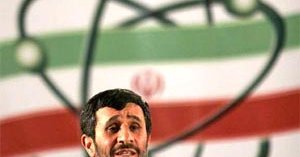The atomic agency’s reports presents evidence that Iran has done extensive research and testing}, though not saying exactly how far, on how to fashion the components of a weapon.
Yet Iran has been misread many times in the past. Upon Ahmadinejad’s ‘surprise’ re-election as president in the last June elections, Obama’s dream for a new Middle East was torpedoed. President Obama had clearly stated his intent of ‘a world without nuclear weapons’, hence his disappointment with Iran’s president came all too quickly.
Many people in Washington had got it wrong in thinking that Mousavi was likely to win the June election. But why? Probably the answer lies in the fact that such people heard what they wanted to hear. Despite Ahmadinejad’s failure to produce the economic bounty he promised when elected in 2005, America did not appreciate the support he still had in the countryside.
America’s universalism- the believe, or rather the myth, that even after the Shah fell, there exists a mass movement of people demanding liberalization has got to be put in its true light. America, as well as the West, believe in the growth of such a movement, that if encouraged would eventually form a majority and rule the country. Undoubtedly, such a movement among professional classes and students in Tehran exists, but they are not exactly the majority in Iran. Indeed, America and Europe have been misreading Iran for 30 years.
The time seems to be ripe for negotiating, but is Iran ready or even willing to compromise at all?
Meanwhile, Tehran insists that its nuclear enrichment programme is for civilian purposes only, but can such a theory hold? If one thinks of Iran itself, and Islamic Republic and anti-Semitic Republic, then other reasons would arise. For instance, the wound with Israel has not yet healed. Iran, in fact, still does not recognize Israel, and does not hold diplomatic ties with the U.S. since the Iranian revolution.
The Geneva meeting and the first formal talks between America and Iran in thirty years are both positive and aiming for the best. The time seems to be ripe for negotiating, but is Iran ready or even willing to compromise at all? The 28th of September was not a good start, as Iran tested the firing of its Shahab- 3 missile, capable of reaching Israel and beyond. Moreover, after the discovery of the uranium- enrichment plant buried in a mountainside near Qom, Iran did not exactly open its doors to inspectors. These incidents all point out to the failure of Iran’s claimed peaceful purposes.
America, Britain and France are working on the harmonization of a nuclear free world; however there are two other powerful countries which must not be ignored; China and Russia- both disliking sanctions. Their cover to Iran makes the dream of a safe world improbable. Given these circumstances, Obama’s nuclear free world seems hard to achieve. If ever this goal is reached, it will most probably not be in the present future.

Follow the comments: |
|
